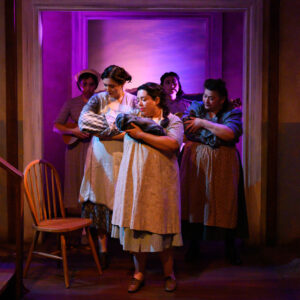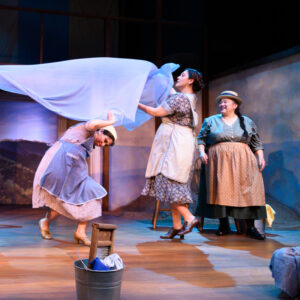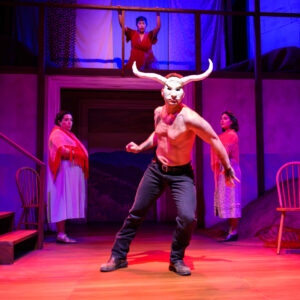Yerma
Melinda Lopez (Adaptation & Translation)
Based on the Play by Federico García Lorca
Shotgun Players

An opening scene of passionate lovemaking; a happy realization of a late period; and a pregnant, young woman singing sweetly a mesmerizing lullaby are still not enough to belie the feeling that all is not going as well as it at first seems. The fact that the mother-to-be admits she is only five days late, the fact she promises her husband to keep it a secret but immediately tells two of her closest friends, and especially the fact that the evening’s pre-publicity and program speak of the play’s themes of “infertility, marriage, and motherhood” are clues enough that this initial joy is going to be short-lived. But what becomes ever clearer is that the young woman, Yerma, is obsessed to her very core to become a mother, to hold her own child in her arms.
Her steadfast, difficult journey is the subject of Shotgun Players’ latest offering, Yerma, a story rich in Latin culture with Latina women center stage throughout. Based on the original 1934 play by Federico García Lorca, this adaptation and translation by Melinda Lopez and directed by Katya Rivera incorporates the poetry of Lorca, original music in song and instruments, both dance and choreographed movement, and an impressive, expressive all-Latine cast. The result is a play that alternates between scenes of stark reality and scenes fantastical and dreamlike, together that tell in its two-hours what we sense very early on and increasingly know each subsequent minute that Yerma’s obsessive drive to spawn new life is an all-encompassing, slowly self-destructing, no-exit journey.
Understanding the life of Federico Lorca helps in understanding Yerma’s unstoppable persistence to have a family and the manner her story is told in this adaptation. The poet and playwright was a surrealist, using metaphors and symbols in his works. He was also a gay man at a time that being gay in the increasingly nationalistic Spain was dangerous. His own probable, but impossible-to-fulfill desires for love, acceptance, and family are intertwined throughout Yerma; and the sense of some impending doom in the play is eerily a premonition of his own assassination two years after the play’s writing.

is stunning as she portrays the transformation of a young woman of hope, smiles, and a song in her heart to one a decade later who has become feverish and frantic in her need to be a mother. Her Yerma is in a desperate search to “do whatever it takes” and to know “what am I doing wrong” as she seeks advice of an older woman of her Southern California village. She puts her feet in mud at nighttime, hoping to connect to the power of the earth to empower her body to generate life. Her pained expressions, her eyes that seem to be always searching for Nature’s answers, and her hearing in the fields what she is sure is the cry of a baby are all part of her daily existence. Yet she remains steadfast year after barren year, expressing assuredly, “When I have a child, I’ll forget my time before.” When more than once an elder woman suggests that she seek the bed of someone other than a husband that is rarely next to her at night, she roundly rejects the idea: “What about my honor?”

The husband her father coaxed her to marry is an ambitious Juan, the product of three generations of pig farmers who has looked to the earth for his fortune, becoming a grower of wine grapes. Caleb Carbrera’s Juan shares early on much of Yerma’s excitement for a child; but as the sorrows of miscarriages and no pregnancies mount through the years, his own obsession becomes making his barren fields bountiful. His Juan also undergoes transformation; but it is one that plagues his wife, leading to a gulf between the two that is increasingly expressed through his unfounded suspicions of a wife cheating on him and her constantly hounding him to ignore his passion for his crops and find passion in her bed.
Surrounding the story of Yerma and Juan is a bevy of village women, all of whom seem constantly in some state of being pregnant and of dealing with the joys and woes of growing families. Alejandra Wahl is Yerma’s childhood, loving, sweet friend, Maria, who initially shares Yerma’s thrill about possible motherhood but who through the years – as her brood grows and grows – often expresses to the childless Yerma, “Do you know how much I envy you?”
Some other women of the village share that same wish to have more time to themselves and to live in a nice, peaceful, sans kids home as does Yerma; but they also quickly join in the gossip with those who criticize and blame Yerma for not being able to attract Juan away from grapes and back into her bed. The divide among the women becomes so intense that those for and against Yerma even break out into a washday, pushing-and-shoving, wet-clothes-throwing battle.

But the same group of women also provides us with wonderful pauses in the Yerma story to see glimpses into their lives as Latinas. A gathering at the river for washing clothes turns into a rousing harmony of voices singing and playing instruments of washboards and metal barrel while rhythmically clapping and stomping impressively in an impromptu dance. At other points, we witness the village women prayerfully chanting a poem outside Yerma’s home of “bring her a child” or see a solemn procession of women carrying candles as they sing softly on a night when prayers call for the bounty of motherhood to be bestowed on the town’s couples.
But in all these scenes of female companionship, Yerma is mostly absent. She is a self-induced outsider, someone still seeking what is in her mind the necessary ticket of a child in order to enter into their presence.
In that group is Dolores (Aisha Aurora Rivera), a mystical woman said to have special powers to help women without child, and her daughter, Marta (Linda Maria Girón) who reaches out sympathetically to Yerma and is a voice among the other women on behalf of Yerma. Mylo Cardona plays a snappy, snarky Veronica, who is fast to flame the gossip about Yerma while Linda Amayo-Hassan is particularly impressive as an elder known as Incarnación who gives Yerma advice, encouragement, and a possible route to motherhood circumventing Juan.

Into this realm of locals who become part of Yerma’s life is a boyhood friend of both she and Juan, Victor, played by Samuel Prince who is able to take few scripted lines and add his own longing looks at Yerma to write another storyline plain to see. Between them, there is an electricity that speaks of some untold history – perhaps one that a father once decided a boy who was destined always to be a sheep farmer like his father was not the boy to marry his Yerma. Samuel Prince also plays a powerful role full of animalistic eroticism as part of a vivid dream that Yerma has.
Katya Rivera sensitively and skillfully weaves together scenes of the stark, harsh story of Yerma’s drive with moments of womenfolk hilarity, of poetic pauses in song and word, and of scenes metaphorical and surreal in a manner surely Lorca would approve. Her choice to ask sound designer Sebastian Gutierrez to compose original music that turns Lorca’s words and poems into interspersed, often hypnotic songs of Latin feel is brilliant, as is his choice to use the recordings of cast member Aisha Rivera’s flamenco dancing as the music’s ongoing percussion. Nina Ball’s mixture of a desert’s piles of sand/dirt and of wood-plank steps leading to a plain balcony enwrapped in various hung cloths paints the harsh, desert environment where these women exist near the border with Mexico. Sara Saavedra’s lighting design and Valera Coble’s aproned costumes complete the feeling of a harsh and barren-of-riches life these women live – all save the much better dressed Yerma.
For all the power of the cast performances – especially that of Regina Marones – and for all the enjoyment of the music created to enhance Yerma’s story, the overall telling becomes somewhat tedious and too repetitive of theme. What is two-hours with a very interruptive intermission feels like it could be told in tighter fashion as a one-act, maybe ninety-minute or less telling. Even with a rather shocking and surprising ending, it feels we know up front where this story is going and that we must endure too long its telling, even as we are generously entertained by music, local color, and much fine acting.
Rating: 3.5 E
Yerma continues live on stage through June 18, 2013 (with two, live-streamed performances June 1 and June 8) in production by Shotgun Players on the Ashby Stage, 1901 Ashby Avenue, Berkeley, CA. Tickets are available online at https://shotgunplayers.org/ or through the box office (510-841-6500, ext. 303 and boxoffice@shotgunplayers.org .
Photo Credits: Ben Krantz

Leave a Reply